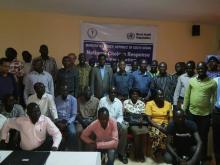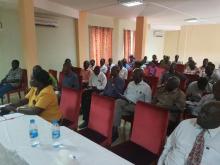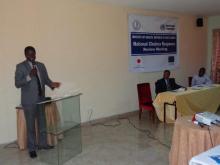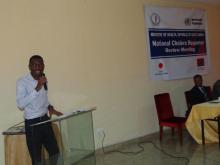Health partners to go ahead of the cholera response to prevent future outbreaks in South Sudan
24 November 2016, Juba, South Sudan – Cholera continues to be a public health threat to children, young adults, and other vulnerable groups in South Sudan. The recurrent outbreaks since 2013 demonstrate the continued vulnerability of the population to the disease, which is preventable and treatable. Since 21 July 2016, more than 3 100 cholera cases and 44 deaths have been reported with a case fatality rate of 1.4%.
The deteriorating security situation in South Sudan coupled with the disruption of health services and increased population displacement makes the conditions favorable for transmitting the disease. In addition, the worsening economic situation has made safe water expensive thus leaving the population to resort to unsafe alternatives.
To improve cholera prevention and response in South Sudan, WHO and partners supported the Ministry of Health to review the ongoing cholera response from 23 to 24 November 2016.
The objective was to review the ongoing response to identify multisectoral solutions and broad partnerships to prevent and respond to future outbreaks as well as set an agenda to better coordinate partners to implement integrated approach for cholera control. The integrated approach for cholera control in South Sudan entails enhancing cholera surveillance, social mobilization, improving access to safe water, sanitation and hygiene promotion as well as the use of oral cholera vaccines to prevent and respond to cholera in transmission hotspots.
Dr Maleghemi Sylvester, the WHO EPI Focal Point, commended the Ministry of Health’s leadership in coordinating the health and water, sanitation and hygiene (WASH) response to prevent further spread. He also added that “cholera in South Sudan entails not only the speedy detection and treatment of cases, but also improving water and sanitation, as well as working closely with communities on behavioral change”. The cholera task force, jointly chaired by the Ministry of Health, WHO and UNICEF, regularly reviews the implementation of the cholera response plan to tackle the cholera epidemic and address the larger issues of water-borne diseases by ensuring clean water and adequate sanitation, together with improved hygiene practices at the community level.
Cholera is a bacterial infection that can kill within hours if left untreated and thrives in areas of overcrowding, scarcity of safe water, poor sanitation and waste management, poor nutritional status, and poor access to health care services.
Dr John Rumunu, the Director General for Preventive Health Services at the Ministry of Health, highlighted the important role of partnerships to speed the cholera response to prevent widespread outbreaks. “This coordinated rapid response to control and prevent cholera cases is the result of all the concerted efforts of partners who have worked together to address and overcome the risk of cholera transmission which pose a threat to our well-being”, he said.
In addition to the health and WASH interventions, intensive and focused social mobilization efforts also enhanced prevention and control, said UNICEF Chief of Health, Dr Ketema Bizuneh.
At the end of the review, the partners agreed to strengthen collaboration with other sectors to work towards cholera prevention and identified long term approaches including: cholera risk and vulnerability mapping; broader use of OCV to complement the conventional intervention for cholera response; engage policy makers to allocate resources to address the underlying cause and invest for long term solutions for cholera prevention and control.
WHO committed to continue to support towards the long-term solution for preventing both cholera and other water-borne diseases. WHO with funding from the European Civil Protection and Humanitarian Aid Operations (ECHO), the Government of Japan and the United States Agency for International Development (USAID) has been supporting the cholera prevention and treatment efforts through provision of supplies including tents and cholera kits, strengthening disease surveillance and comprehensive disease investigation, training community health workers to conduct outreach activities on cholera prevention and control, establishment of cholera treatment center as well as supporting social mobilization and community engagement activities.
The elimination of cholera in South Sudan requires a multisectoral response that entails rapid response to ongoing outbreaks in the immediate term as investments are made to improve access to water and sanitation in the long term. This requires support for national capacities and sustained and sufficient financial resources.
____________________________________________
For more information please contact:
Dr Allan Mpairwe, +211 955 372 370, mpairwea [at] who.int
Dr Wamala Joseph Francis, +211955036445, wamalaj [at] who.int
Dr Sylvester Maleghemi, +211 956 779 467, maleghemis [at] who.int
____________________________________________
01 Participants posing for a group photo
02 Cross section of the participants
03 Dr John Rumunu delivering a speach
04 Dr Maleghemi Sylvester making an opening remarks




